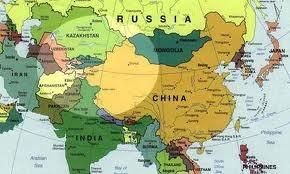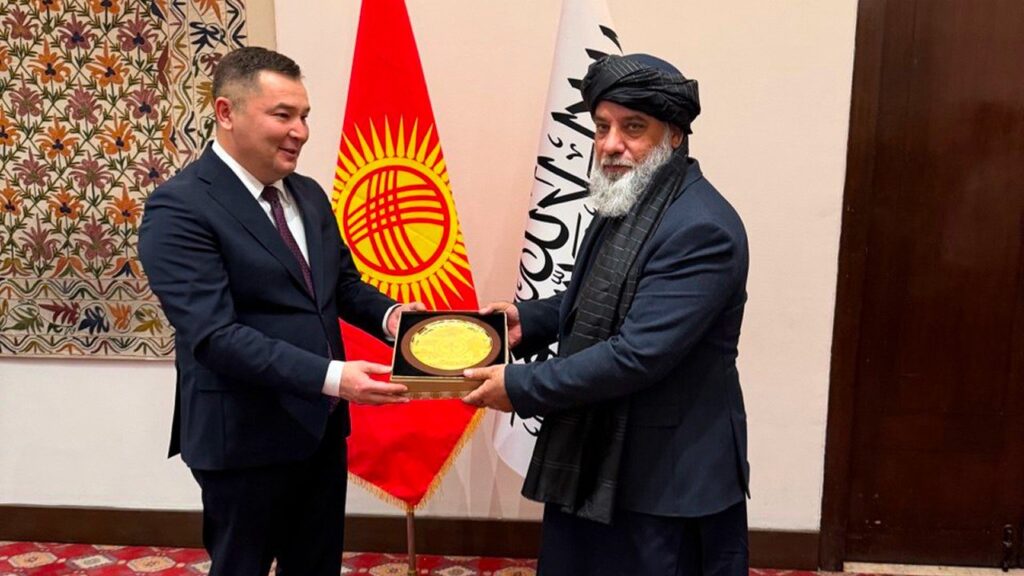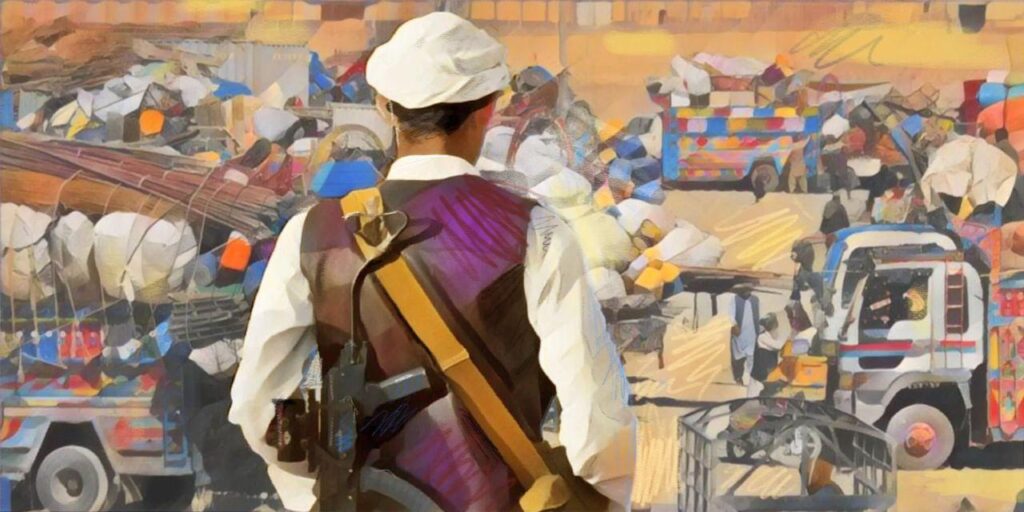BISHKEK (TCA) — The Publisher’s note: Throughout the 19th and 20th centuries, Central Asia was the scene of intense geopolitical struggle and the Great Game between the British and Russian Empires, and later between the Soviet Union and the West, over Afghanistan and neighboring territories. Into the 21st century, Central Asia has become the area of a renewed geopolitical interest, dubbed the New Great Game, largely based on the region’s hydrocarbon and mineral wealth. On top of that, the region now is perhaps the most important node in the implementation of China’s One Belt, One Road initiative through which Beijing aims to get direct access to Western markets. Every week thousands of news appears in the world’s printed and online media and many of them may escape the attention of busy readers. At The Times of Central Asia, we strongly believe that more information can better contribute to peaceful development and better knowledge of this unique region. So we are presenting this Weekly Digest which compiles what other media have reported on Central Asia over the past week.
KAZAKHSTAN
Is Kazakhstan’s political opposition creeping back?
As President Nazarbayev will turn 78 this year, the power succession issue is becoming even more relevant in Kazakhstan, prompting a re-emergence of the country’s opposition on the political scene
May 28 — “After a long hibernation, organized political opposition is making a comeback in Kazakhstan. For over five years, the country’s political scene has been utterly moribund. The parties that are allowed to exist sing from the same hymn sheet as the authorities. Dissenters have either found their organizations banned or have withered away into insignificance.” READ MORE: https://timesca.com/index.php/news/19800-is-kazakhstan-s-political-opposition-creeping-back
Minister: Developing digital economy is matter of national security for Kazakhstan
In an interview, Kazakh Minister of Information and Communication tells about the Digital Kazakhstan programme and the country’s plan to join the world’s digital giants
May 29 — “Kazakhstan is developing its digital technologies in many fields, such as the economy, agriculture or administration, and the Central Asian country also wants to become a pioneer in digital innovation, with the creation of technology hubs and parks.” READ MORE: https://www.euractiv.com/section/central-asia/news/minister-developing-digital-economy-is-matter-of-national-security-for-kazakhstan/
Kazakhstan: Russian military to leave Baikonur base?
The civilian status of Baikonur would make it possible to attract more private-sector interest in the cosmodrome
May 30 — “A senior official in Kazakhstan has confirmed that the government is considering options for Russia to end its military presence at Baikonur cosmodrome, which is currently leased to Russia. Speaking on May 30, Defense and Aerospace Industry Minister Beibut Atamkulov said, however, that a definitive decision on the issue has yet to be made.” READ MORE: https://eurasianet.org/s/kazakhstan-russian-military-to-leave-baikonur-base
Copied Free Birds: Plagiarism Allegations Hit Kazakhstan’s Government Again
The subject of the matter is the bird-shaped logo of a state program aimed at the modernization of society. The concept, shape, and colors of the logo are suspiciously similar to the one used by L’Aigle de Patmos, a French theater company, in 2009
May 30 — “Kazakhstan’s government has come under fire on social media once again for the alleged plagiarism of the logo of one of the most visible public initiatives in the country, fueling public disappointment.” READ MORE: https://thediplomat.com/2018/05/copied-free-birds-plagiarism-allegations-hit-kazakhstans-government-again/
KYRGYZSTAN
Kyrgyzstan: green activists sound alarm over air pollution in Bishkek
Kyrgyzstan is an agrarian country, but even the development of agriculture leads to a deterioration of the ecological situation in the country
May 29 — “Environmentalists are asking the President of Kyrgyzstan to declare 2019 the year of ecology. This was announced at the recent roundtable on air pollution problems in the capital Bishkek. Parliament members, representatives of the Achyk Asman (Clean Air) youth environmental movement, civil society, and the media took part in the discussions.” READ MORE: https://timesca.com/index.php/news/19805-kyrgyzstan-green-activists-sound-alarm-over-air-pollution-in-bishkek
Kyrgyzstan: Former PM charged with corruption over power plant project
The corruption case concerning the Bishkek power plant modernization by a Chinese company is playing out against the backdrop of a behind-the-scenes battle for political influence between President Sooronbai Jeenbekov and his predecessor, Almazbek Atambayev
May 29 — “Security services in Kyrgyzstan said on May 29 that they are charging the recently fired prime minister on corruption offenses — a bold move that will raise the stakes in a deepening political standoff.” READ MORE: https://eurasianet.org/s/kyrgyzstan-former-pm-charged-with-corruption-over-power-plant-project
Kyrgyz Bride Kidnapping Ends In Brutal Stabbing, Prompting Outrage
Bride kidnapping has been illegal for years in Kyrgyzstan but its prosecutions have been rare, as police and prosecutors often try to force the two sides to resolve the matter peacefully between themselves
May 29 — “Kyrgyz authorities are investigating the brutal stabbing death of a 20-year-old woman by a man who had abducted her hours earlier near Bishkek as part of a longstanding but illegal Kyrgyz practice known as “bride kidnapping.” READ MORE: https://www.rferl.org/a/kyrgyz-bride-kidnapping-ends-in-brutal-stabbing-prompting-outrage/29257873.html
How Kyrgyzstan’s new president turned on his mentor
The recent developments in Kyrgyzstan have shown that the power succession scheme designed by former President Atambayev has proven to be his mistake
June 1 — “It was just half a year ago that Kyrgyzstan made history with its first peaceful handover of power from one elected president to another. Before ending his single permitted six-year term, Almazbek Atambayev looked around for a friendly successor to anoint. The choice fell on Sooronbai Jeenbekov, a long-time associate. His loyal then-prime minister would surely be a dependable and even a malleable head of state as he continued to operate in the background, he must have thought.” READ MORE: https://timesca.com/index.php/news/19820-how-kyrgyzstan-s-new-president-turned-on-his-mentor
TAJIKISTAN
ADB considered Tajikistan’s main international donor
The economy of Tajikistan is heavily dependent on borrowed funds — mainly coming from China and international financial organizations
May 30 — “About 82 percent of financing approved by international development banks in the first quarter of this year for Tajikistan falls on the Asian Development Bank (ADB). “In Tajikistan, the bulk of investments are accounted for the ADB’s $90 million loan in the transport sector,” according to the international development banks’ investment review for the first quarter of 2018 published by the Eurasian Development Bank.” READ MORE: https://www.azernews.az/region/132764.html
Seminar Held On Pakistan-Tajikistan Tourism, Opportunities
Tour operators, tourism promoters and hotel management officials from both countries are set to boost tourism between the two nations
May 31 — “Pakistan Tourism Development Corportation (PTDC) in collaboration with Embassy of TajikistanThursday organized a one day seminar on Tajikistan “the land of opportunities for Tourism Industry Pakistan”. READ MORE: https://www.urdupoint.com/en/pakistan/seminar-held-on-pakistan-tajikistan-tourism-358754.html
Russia, Tajikistan talk over strategic co-op
Russia remains an important strategic partner for Tajikistan, as hundreds of thousands of Tajik labor migrants make their living in Russia and altogether send millions of dollars back home
May 31 — “Russian Prime Minister Dmitry Medvedev invited President of Tajikistan Emomali Rahmon to “discuss the whole complex of strategic cooperation” between Moscow and Dushanbe. The president of Tajikistan assured that the development of relations with Russia is a priority in the country’s foreign policy, TASS reported.” READ MORE: https://en.trend.az/casia/tajikistan/2910907.html
TURKMENISTAN
Hunger And Eviction: Money Woes Send Turkmen Students Abroad Scrambling
In recent months Turkmen citizens abroad have been complaining about their debit-card problems
May 26 — “A Russian ATM machine’s repeated rejection of his efforts to withdraw cash from his Turkmen bank led one student to cut up his bank card and try to cook it for a meal. Video of the culinary first (he did add salt) that was sent to RFE/RL’s Turkmen Service was a humorous attempt to express the utter frustration felt by many of the thousands of Turkmen students studying around the world who are unable to get money from their bank accounts back home.” READ MORE: https://www.rferl.org/a/turkmenistan-debit-cards-financial-cutoff-students-hunger-eviction/29252238.html
Turkmenistan’s Natural Gas Dilemma
Ashgabat risks to get involved in a regional Saudi-Iranian standoff, which may negatively affect the implementation of the TAPI gas pipeline project through Afghanistan and leave Turkmenistan without much-needed gas-export revenues
May 29 — “Amid much (obligatory) fanfare, Turkmenistan has intensified its spin campaign on TAPI, the long-delayed pipe dream of President Gurbanguly Berdimuhamedov which is supposed to supply Afghanistan, Pakistan and India with Turkmen natural gas. Turkmenistan claims it is on the brink of securing the $8 billion it needs for the construction financing, stating it is a mere matter of several months until they attain that point and that negotiations have been proceeding with numerous counterparties.” READ MORE: https://oilprice.com/Energy/Natural-Gas/Turkmenistans-Natural-Gas-Dilemma.html
Turkmenistan: Cotton bans and whitewashes
In its ‘Akhal-Teke: A Turkmenistan Bulletin’, Eurasianet reviews the main news and events in the Central Asian country for the previous week
May 29 — “It is not often that you hear about cotton from Turkmenistan, although you may unknowingly be wearing it. Following a successful campaign by the Washington-based advocacy group International Labor Rights Forum, or ILRF, the crop may earn a higher profile while less of it will be exported.” READ MORE: https://eurasianet.org/s/turkmenistan-cotton-bans-and-whitewashes
Speakers urge protection of agro-economy while laying TAPI Gas Pipeline
Pakistan has concerns about the environmental and social impacts of its section of Turkmenistan-Afghanistan-Pakistan-India (TAPI) gas pipeline
June 1 — “Over 400 kilometres section of Turkmenistan-Afghanistan-Pakistan-India (TAPI) Gas Pipeline, which will pass through the Punjab province, should fully conserve and protect agro-economy of the province, especially sugarcane and mango farms of the districts that will come across the proposed route of the pipeline.” READ MORE: https://tribune.com.pk/story/1724543/1-speakers-urge-protection-agro-economy-laying-tapi-gas-pipeline/
UZBEKISTAN
Uzbekistan assailed by cataclysmic sand and salt storm
The Aral Sea disaster continues taking its toll on the agriculture and health of people in Central Asia
May 30 — “Remote western regions of the Uzbekistan have for several days been assailed by a cataclysmic sand and salt storm. Meteorological authorities have been cited by local media as saying that the content of sand and salt in the air in the near-Aral region has exceeded the norm by almost sixfold.” READ MORE: https://eurasianet.org/s/uzbekistan-assailed-by-cataclysmic-sand-and-salt-storm
PROJECT EXILE: UZBEKISTAN CONTINUES BAN ON EXILED JOURNALIST
Exiled Uzbek journalist on the state of human rights in Uzbekistan today
May 30 — “Hamid Ismailov deserves an apology. Or at the very least, an explanation. It has been 26 years since the events that led Uzbek journalist Ismailov to leave his home country of Uzbekistan and flee to the United Kingdom. In the 1990s, Ismailov was working with a BBC television crew to make a film about Uzbekistan. The repressive regime in power under Islam Karimov opened a criminal case against Ismailov. The authorities said Ismailov was trying to overthrow the government.” READ MORE: https://globaljournalist.org/2018/05/project-exile-uzbekistan-continues-ban-on-exiled-journalist/
Uzbekistan to receive Japanese machinery worth $7.3 mln for free
Uzbekistan is taking efforts to build new motor roads and repair the existing ones
May 31 — “Japan will donate to Uzbekistan a lot of road construction equipment worth 800 million Japanese yens or about $7.3 million. This is provided for by exchange notes, which were signed by representatives of Uzbekistan and Japan in Tashkent on May 30.” READ MORE: https://www.azernews.az/region/132827.html
Uzbekistan to buy out GM stake in car factory – report
Along with Kazakhstan, Uzbekistan is a leading manufacturer and exporter of cars in Central Asia
May 31 — “Uzbekistan plans to buy GM’s remaining 10 percent stake in the U.S. carmaker’s plant in the country this year, Uzbek news website Gazeta.uz quoted state auto company chief Umidjan Salimov as saying on Thursday.” READ MORE: https://www.reuters.com/article/uzbekistan-gm/update-1-uzbekistan-to-buy-out-gm-stake-in-car-factory-report-idUSL5N1T254Z
AFGHANISTAN
U.S. Attacks Taliban’s Source of Funds in Afghanistan
US military now hit Afghanistan’s illegal poppy and narcotics industry — the main source of finance for the Taliban
May 30 — “The U.S. has retooled its aerial bombing campaign in Afghanistan to target the Taliban’s sources of money, not just its fighters. Since the strategic bombing campaign began in November, U.S. aircraft have conducted 113 strikes aimed at cutting off revenue the Taliban allegedly receive from opium poppies and roadside taxes, a major shift in war strategy intended to drive the insurgents to the negotiating table.” READ MORE: https://www.wsj.com/articles/in-afghanistan-u-s-attacks-talibans-source-of-funds-1527672601
Lessons learned from the U.S. experience in Afghanistan
Remarks that John F. Sopko, Special Inspector General for Afghanistan Reconstruction, delivered on May 24, 2018
May 30 — “The fourth lessons-learned report from the Special Inspector General for Afghanistan Reconstruction (or SIGAR), entitled “Stabilization: Lessons from the U.S. Experience in Afghanistan,” is the culmination of two years of work and examines the U.S. stabilization effort in Afghanistan. It details how USAID, the State Department, and the Defense Department tried to support and legitimize the Afghan government in contested districts in Afghanistan from 2002 through 2017.” READ MORE: https://www.brookings.edu/blog/order-from-chaos/2018/05/30/lessons-learned-from-the-u-s-experience-in-afghanistan/
THE TALIBAN IS HOLDING SECRET NEGOTIATIONS WITH GOVERNMENT AS AFGHANISTAN VIOLENCE ESCALATES, MILITARY COMMANDER REVEALS
Analysts say the increase in violence by the Taliban has given the insurgent group more leverage and forced the government in Kabul to pursue talks more aggressively
May 31 — “As violence in Afghanistan continues to mount, the Taliban is secretly holding a meeting with the government in Kabul, U.S. military officials revealed. The Afghan government had first offered to meet with Taliban leaders in February, but their overtures were ignored, according to reports at the time. Now, top U.S. military officials say talks are taking placebehind the scenes, and that international organizations and other foreign governments are also participating in the negotiations” READ MORE: http://www.newsweek.com/taliban-holding-secret-negotiations-government-afghanistan-violence-escalates-951170
The Tashkent conference on Afghanistan: too much diplomacy, too little solution
Achieving peace in Afghanistan requires the resolve and joint efforts of many players inside the war-torn country, in the Central Asia region and beyond — but the interests of those players still differ
May 31 — “On March 26-27, 2018, the unprecedented international conference on Afghanistan, “Peace process, security cooperation and regional interactions,” took place in Uzbekistan’s capital Tashkent. Diplomatic representatives of 21 states, the UN and the EU participated in the conference and signed its final Tashkent Declaration.” READ MORE: https://timesca.com/index.php/news/26-opinion-head/19815-the-tashkent-conference-on-afghanistan-too-much-diplomacy-too-little-solution
WORLD
Geopolitics and Conflict Potential in Central Asia and South Caucasus
Analyst believes that geography determines not only the political but also the economic orientations of Central Asia
May 25 — “Two post-Soviet Caspian Sea sub-regions – Central Asia and the South Caucasus – have experienced different conflict scenarios. The South Caucasus has been embroiled in protracted, large-scale armed conflicts, while Central Asians have managed to avert a serious armed conflict, remaining largely peaceful in spite of local, short-term, small-scale clashes, and the existence of factors that may have led – and still may potentially lead – to a serious military conflict.” READ MORE: https://www.geopoliticalmonitor.com/geopolitics-and-conflict-potential-in-central-asia-and-south-caucasus/
Are Central Asia’s Militants Already Coming Home From The Middle East?
Hundreds of natives of post-Soviet republics of Central Asia who fought in the ranks of the Islamic State in Syria and Iraq may pose a serious threat when they return to their home countries
May 25 — “Kyrgyzstan appears to be waging a major battle on its own soil against alleged members of “international terrorist organizations.” In less than 12 months, there have been at least 28 security operations that resulted in apprehending suspects who Kyrgyz authorities say were connected to terrorist groups in Syria and Iraq.” READ MORE: https://www.rferl.org/a/qishloq-ovozo-kyrgyzstan-militants-coming-home-central-asia-middle-east-/29251178.html









